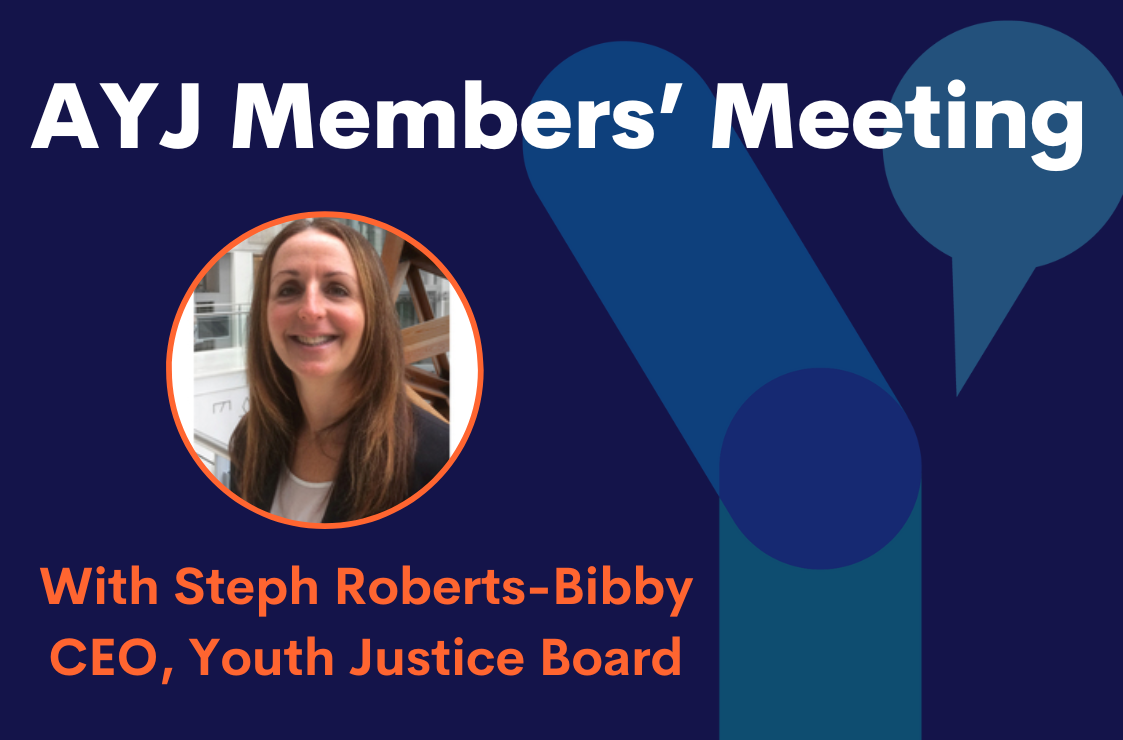AYJ Quarterly Members’ Meeting: January 2024
On 24th January we hosted our Quarterly Members’ Meeting, which featured a presentation from Steph Roberts-Bibby, Chief Executive Officer of the Youth Justice Board for England and Wales (YJB), and a Q&A where members were able to ask Steph about the YJB’s priorities and actions, and share their concerns.
Keynote speaker
Steph highlighted how the YJB is actively implementing new oversight arrangements, driving up system performance, and providing objective advice to ministers. They are prioritising work to address disparities, as well as working across partnerships to improve outcomes for children and reduce reoffending rates by focusing on prevention and early intervention. The presentation discussed how, in the past year, the YJB has introduced a new oversight framework which they were able to develop, publish and now embed. This framework aims to identify successful service areas, understand the reasons for their success, and offer support to services facing challenges in better assisting vulnerable children. Steph provided additional insights into YJB’s priorities for the next three years, with the primary focus on delivering positive outcomes for children, with a specific aim to reduce offending and promote the creation of safer communities. Steph welcomed the opportunity to engage with AYJ members and the opportunity for reflection on changes made by YJB in the past year, focusing on collaboration and engagement to harness experiences in the sector.
Member Q&A:
Work to address ongoing racial disparities throughout the system: Steph shared examples that highlighted the disparities that are evident throughout the system, and efforts that are underway to address these issues at a local, regional and national level. These examples included partnership work in the London Borough Haringey involving collaboration with the police to improve stop and search, and the Youth Custody Service’s ongoing work around safer vetting - with the YJB's active involvement and engagement on their board. Efforts are underway to address the diverse needs of children, yet questions continue about their radicalness and timely implementation across policing, the youth justice system and the secure estate. Steph emphasised the importance of relational practice, recognising highly individualised journeys that are impacted by a range of systemic factors that can drive disparities within and between different groups.
The role of the YJB in relation to youth custody: Steph highlighted issues with the current operating model within the children and young people’s custodial estate, emphasising broader concerns around the availability of appropriate accommodation and holistic wraparound care for children. She noted that collective attention is needed to support the Youth Custody Service and facilitate the opening of the new Secure School by Oasis. Members raised questions about the commitment of the Ministry of Justice to the rollout of Secure Schools beyond Oasis Restore in Medway and how they are using their current resources in the best interests of children in custody.
The role of the HMI Probation (HMIP) in inspecting youth justice services: YJB closely collaborates with HMIP, focusing on child-first practice and considering how this is reflected in HMIP's oversight framework. In the coming weeks, Steph will be discussing youth justice services’ inspections with the newly appointed Chief Inspector of Probation, Martin James. She also suggested that strengthened collaboration between Ofsted and HMIP could help to recognise the integral connection between youth justice services and broader children's services.
Sector Updates:
Joe Lane, Head of Policy and Research at Action for Children, provided insights on the Jay Review of child criminal exploitation which aims to better understand the dynamics of exploitation, evaluate service responses, and assess available support for young victims. He also spoke about the Children at the Table campaign, which aims to place children's needs and voices at the core of the decision-making process and ensure collaboration among politicians across the government to enhance the wellbeing of young people.
Colleagues from New Horizon Youth Centre briefed us on the Plan for the 136k campaign to end youth homelessness. New Horizon highlighted the link between youth homelessness and the criminal justice system, attributing involvement to the rental crisis, housing issues, and poverty. Their ‘Plan for the 136k’ campaign, supported by 120 organisations, calls on the UK Government to create a national strategy to end youth homelessness. More information about the petition is available here.
Members also shared perspectives on setting the agenda for the next government and activities around the upcoming general election.
AYJ updates:
We shared information about our engagement with parliamentarians and policymakers from the previous quarter, and shared policy updates with members:
We have been focusing on the development of member expert groups, improving engagement and launching new events. We are launching a new forum in February to discuss child-centred policing and non-policing solutions with the aim of ‘Keeping Children Safe’ and our work continues around ensuring ‘Custody as a Last Resort’ in the future Youth Custody strategy and broader youth justice agenda.
The team have also been working with members and partners on a number of exciting events to share learning from our project work in February. An online panel event will highlight the experiences of racially minoritised young people in transition in the criminal justice system and the role of specialist organisations in supporting them. The Young Advocates will be celebrating the achievements and peer-research recommendations in a final showcase coming up at the end of the month.


